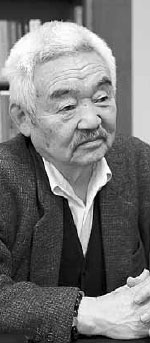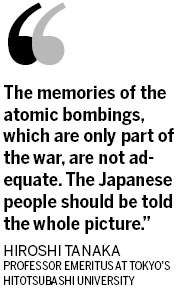Historical revisionism
At his inaugural news conference on Jan 25, Katsuto Momii, chairman of Japan Broadcasting Corp, or NHK, claimed that all warring nations had the equivalent of "comfort women".
|
 |
|
 |
The strong showing of Toshio Tamogami, the former chief of staff of Japan's air self-defense force, in the Feb 9 election for Tokyo governor suggested an undercurrent of ultraconservatism among the electorate. Tamogami, who denies Japan's war of aggression, came in fourth with 611,000 votes, or 12 percent, leading his camp to declare that a new political force had been born.
Canvassing on the streets of Tokyo on Feb 8, Tamogami said the war of aggression, the Nanjing Massacre and the "comfort women" were all fabrications. The crowd erupted into applause
The 65-year-old said he will continue to visit the Yasukuni Shrine - which commemorates Class-A war criminals, along with the nation's war dead - to restore pride in Japan's history. He also expressed opposition to allowing foreign residents to vote in Japanese elections.
While campaigning for Tamogami, Naoki Hyakuta, a writer and NHK governor, argued that the Tokyo War Crimes Tribunal was designed to cover up US atrocities during World War II, such as the Great Tokyo Air Raids and the bombings of Hiroshima and Nagasaki. He also denied that the Nanjing Massacre occurred.
Tsunehira Furuya, a commentator who also backed Tamogami, claimed that Internet right-wingers have emerged as a new political force.
Statements like Furuya's left Tanaka decidedly worried: "Erroneous views are circulating on Japan's Internet. Young people read little and get the knowledge they want from the Internet. No wonder they are under the influence of the wrong views. It's a big problem."
Chinese forced labor
While Tanaka's personal experience with foreign students was the catalyst for his interest in Japan's wartime history, his research has provided evidence of more cruel acts committed by Japanese soldiers.
Even before his retirement from the post of professor of sociology at Kyoto's Ryukoku University, Tanaka became a representative of several citizens' groups that work to support foreign residents in Japan. He has also joined a movement to help survivors and family members of Chinese people forced to work in Japan during the war.
Roughly 40,000 Chinese were abducted to undertake hard labor at 135 sites in Japan under a 1942 decree issued by the country's wartime cabinet. Postwar Japanese governments have remained stubbornly mute regarding the responsibility for the policy. Of the 35 Japanese companies that used it, about two dozen are still in operation. They uniformly sought to evade their responsibilities for more than five decades until the year 2000, when Kajima Corp reached a settlement with the Chinese forced to work at its Hanaoka site.
During the war, 986 Chinese were brought to the Hanaoka (present-day Odate in Akita prefecture) copper mine, operated by Kajima Corp, and forced into labor. On June 30, 1945, the laborers rioted because of the poor food, living conditions and forced labor; 113 were killed. By the end of the war, 418 of the forced laborers at Hanaoka had died.
In 1987, Tanaka and like-minded Japanese formed a group to help survivors and relatives of the dead.
Odate, a city with a population of slightly more than 50,000, built a memorial upon which the names of the Chinese laborers were inscribed. The mayor has invited their survivors and heirs to the city for the annual June 30 ceremony of observation.
"Odate is Japan's only city that has observed the event and invited the survivors and the descendants of the Chinese forced laborers," Tanaka said.
A monument to the laborers will be erected in Tianjin on Aug 8.
|
|
|
|
|
|
|
|
